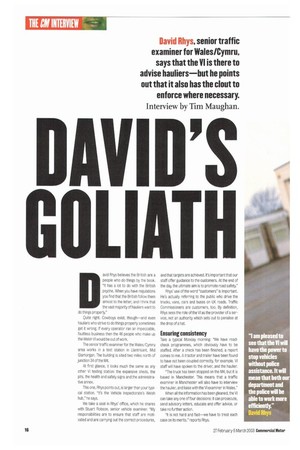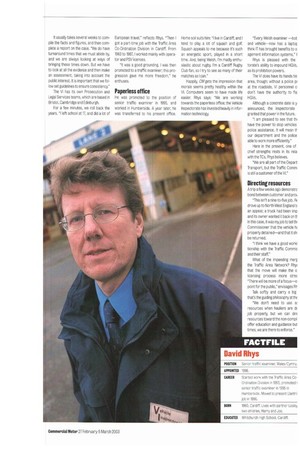AV GOA
Page 16

Page 17

If you've noticed an error in this article please click here to report it so we can fix it.
avid Rhys believes the British are a people who do things by the book. it has a lot to do with the British psyche. When you have regulations you find that the British follow them almost to the letter and I think that the vast majority of hauliers want to do things properly."
Quite right. Cowboys exist, though—and even hauliers who strive to do things properly sometimes get it wrong. If every operator ran an impeccable, faultless business then the 46 people who make up the Welsh VI would be out of work.
The senior traffic examiner for the Wales/Cymru area works in a test station in Llantrisant, Mid Glamorgan. The building is sited two miles north of junction 34 of the M4.
At first glance, it looks much the same as any other VI testing station: the expansive sheds, the pits, the health and safety signs and the administrative annex.
This one, Rhys points out, is larger than your typical station. "It's the Vehicle Inspectorate's Welsh hub," he says.
We take a seat in Rhys' office, which he shares with Stuart Robson, senior vehicle examiner. "My responsibilities are to ensure that staff are motivated and are carrying out the correct procedures, and that targets are achieved. It's important that our staff offer guidance to the customers. At the end of the day, the ultimate aim is to promote road safety."
Rhys' use of the ward "customers" is important. He's actually referring to the public who drive the trucks, vans, cars and buses on UK roads. Traffic Commissioners are customers, too. By definition, Rhys sees the role of the VI as the provider of a service, not an authority which sets out to penalise at the drop of a hat.
Ensuring consistency
Take a typical Monday morning: "We have roadcheck programmes, which obviously have to be staffed. After a check has been finished, a report comes to me. A tractor and trailer have been found to have not been coupled correctly, for example. Vi staff will have spoken to the driver, and the haulier.
The truck has been stopped on the M4, but it is based in Manchester. This means that a traffic examiner in Manchester will also have to interview the haulier, and liaise with the VI examiner in Wales."
When all the information has been gleaned, the VI can take any one of four decisions: it can prosecute, send advisory letters, educate and offer advice, or take no further action.
"It is not hard and fast—we have to treat each case on its merits," reports Rhys. It usually takes several weeks to compile the facts and figures, and then complete a report on the case, 'We do have turnaround times that we must abide by, and we are always looking at ways of bringing these times down. But we have to look at all the evidence and then make an assessment, taking into account the public interest. it is important that we follow set guidelines to ensure consistency" The VI has its own Prosecution and Legal Services teams, which are based in Bristol, Cambridge and Edinburgh.
For a few minutes, we roll back the years. '1 left school at 17, and did a lot of European travel," reflects Rhys. "Then I got a part-time job with the Traffic Area Co-Ordination Division in Cardiff. From 1983 to 1987, I worked mainly with operator and PSV licences.
"It was a goad grounding. I was then promoted to a traffic examiner; this progression gave me more freedom," he enthuses.
Paperiess office
He was promoted to the position of senior traffic examiner in 1995. and worked in Humberside. A year later, he was transferred to his present office. Home soil suits him; "I live in Cardiff, and I tend to play a lot of squash and golf. Squash appeals to me because it's such an energetic sport, played in a short time. And, being Welsh, I'm madly enthusiastic about rugby. i'm a Cardiff Rugby Club fan, so I try to see as many of their matches as loan."
Happily. CM gets the impression that morale seems pretty healthy within the VI. Computers seem to have made life easier. Rhys says: 'We are working towards the paperless office; the Vehicle Inspectorate has invested heavily in information technology
"Every Welsh examiner —bet and vehicle—now has a laptor think IT has brought benefits to o agement information systems."
Rhys is pleased with the torate's ability to impound HGVs, as its prohibition powers.
The VI does have its hands tie area, though: without a police pi at the roadside, VI personnel cl don't have the authority to fla HGVs.
Although a concrete date is y announced, the inspectorate granted that power in the future.
1 am pleased to see that MI have the power to stop vehicles police assistance. It will mean th our department and the police able to work more efficiently."
Here in the present, one of chief strengths rests in its rela with the TCs, Rhys believes.
"We are all part of the Depart Transport, but the Traffic Commi is still a customer of the VI."
Directing resources
A trip a few weeks ago demonstre bond between customer and pro% "This isn't a nine-to-five job. Rc drove up to North-West England tt an appeal; a truck had been imp and its owner wanted it back on if In this case, it was my job to tell th Commissioner that the vehicle hi properly detained—and that it shi be returned.
"1 think we have a good worki tionship with the Traffic Commis and their staff."
What of the impending merg the Traffic Area Network? Rhyi that the move will make the o licensing process more strer -There will be more of a focus—o point for the public," envisages Rh
Talk softly and carry a big that's the guiding philosophy at th( We don't need to use a: resources when hauliers are dc job properly, but we can dirt resources toward the non-compli offer education and guidance but times, we are there to enforce,"


































































































































































